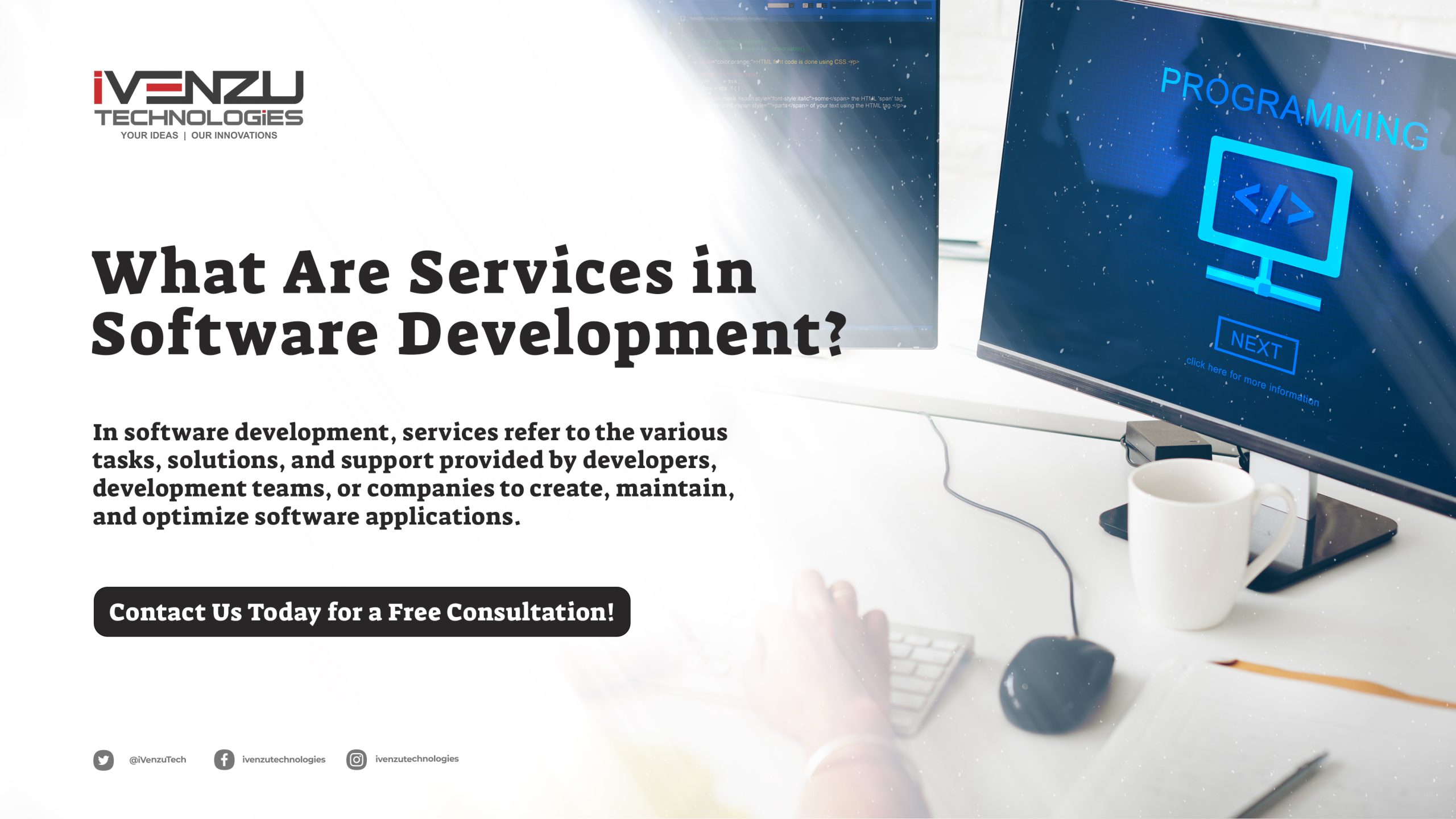What Are Services in Software Development?
In software development, services refer to the various tasks, solutions, and support provided by developers, development teams, or companies to create, maintain, and optimize software applications. These services encompass the entire software lifecycle, from initial planning and design to development, testing, deployment, and ongoing maintenance.

Categories of Software Development Services
Software development services can be broadly classified into the following categories:
1. Custom Software Development
-
- Definition: Tailored software solutions built to address specific business needs or challenges.
- Examples:
-
- Enterprise Resource Planning (ERP) software.
- Customer Relationship Management (CRM) systems.
- Custom mobile or web applications.
-
- Benefits:
-
- Unique functionality.
- Better alignment with business goals.
- Scalability for future growth.
-
2. Web Development
-
- Definition: Designing and building websites or web applications.
- Types:
-
- Frontend Development: Focuses on the user interface and experience (e.g., HTML, CSS, JavaScript frameworks like React or Angular).
- Backend Development: Manages server-side logic, databases, and APIs (e.g., Node.js, Django, Laravel).
-
- Examples:
-
- E-commerce platforms.
- Blogging and content management systems.
- Web portals for businesses.
-
3. Mobile App Development
-
- Definition: Creating applications for mobile devices, including smartphones and tablets.
- Platforms:
-
- Native Apps: Built specifically for iOS (Swift) or Android (Kotlin).
- Cross-Platform Apps: Use frameworks like React Native or Flutter to run on multiple platforms.
-
- Examples:
-
- Social media apps.
- Health and fitness trackers.
- On-demand service apps like Uber.
-
4. Software Maintenance and Support
-
- Definition: Ensuring software remains functional, secure, and up-to-date post-deployment.
- Types of Support:
-
- Bug fixing.
- Performance optimization.
- Security updates.
-
- Benefits:
-
- Extends software lifespan.
- Reduces downtime.
- Adapts to evolving business needs.
-
5. Software Testing and Quality Assurance (QA)
-
- Definition: Identifying and resolving bugs, errors, or usability issues to ensure software quality.
- Types of Testing:
-
- Functional Testing: Verifies that software features work as intended.
- Performance Testing: Assesses speed, scalability, and reliability.
- Security Testing: Ensures the application is protected against vulnerabilities.
-
- Benefits:
-
- Improved user experience.
- Reduced development costs by catching issues early.
-
6. SaaS (Software as a Service) Development
-
- Definition: Building cloud-based software applications that users can access via subscription.
- Examples:
-
- Salesforce (CRM software).
- Dropbox (cloud storage).
- Slack (team communication).
-
- Benefits:
-
- Scalability and accessibility.
- Regular updates and improvements.
- Lower initial investment for users.
-
7. DevOps Services
-
- Definition: Practices that combine software development and IT operations to improve collaboration and streamline delivery.
- Services:
-
- Continuous Integration/Continuous Deployment (CI/CD).
- Infrastructure automation (e.g., Docker, Kubernetes).
-
- Benefits:
-
- Faster development cycles.
- Enhanced software reliability.
- Improved resource management.
-
8. Cloud Computing Services
-
- Definition: Developing, deploying, and managing software solutions on cloud platforms.
- Platforms:
-
- AWS (Amazon Web Services).
- Microsoft Azure.
- Google Cloud Platform.
-
-
- Examples:
-
- Cloud-based analytics tools.
- Scalable e-commerce solutions.
- Data storage and processing applications.
-
- Examples:
-
- Benefits:
-
- Flexibility and scalability.
- Cost savings on infrastructure.
- Enhanced collaboration.
-
- Benefits:
9. API Development and Integration
-
- Definition: Creating and integrating APIs (Application Programming Interfaces) to connect different software systems or applications.
- Examples:
-
- Payment gateway integration (e.g., PayPal, Stripe).
- Social media APIs (e.g., Facebook, Twitter).
- Third-party tool integrations like CRM or analytics software.
-
- Benefits:
-
- Streamlined processes.
- Enhanced software interoperability.
-
10. UI/UX Design Services
-
- Definition: Designing intuitive and visually appealing interfaces for software applications.
- Focus Areas:
-
- User Experience (UX): Ensuring the software is easy to use and meets user needs.
- User Interface (UI): Focusing on visual elements like buttons, icons, and layouts.
-
- Benefits:
-
- Increased user satisfaction.
- Higher engagement rates.
- Improved brand perception.
-
11. Enterprise Software Development
-
- Definition: Creating large-scale software solutions to manage business processes.
- Examples:
-
- Supply chain management software.
- HR management systems.
- Finance and accounting tools.
-
- Benefits:
-
- Improved operational efficiency.
- Centralized data management.
- Automation of repetitive tasks.
-
12. Cybersecurity Services
-
- Definition: Protecting software applications and data from cyber threats.
- Services:
-
- Penetration testing.
- Data encryption.
- Real-time threat monitoring.
-
- Benefits:
-
- Ensures compliance with regulations.
- Protects sensitive data.
- Builds user trust.
-
Benefits of Software Development Services
Software development services can be broadly classified into the following categories:
1. Enhanced Efficiency
-
- Custom solutions streamline workflows and eliminate redundancies.
2. Scalability
-
- Software can grow and adapt alongside a business’s evolving needs.
3. Cost Savings
-
- Automated processes reduce operational costs.
4. Software Maintenance and Support
-
- Well-designed applications lead to higher user satisfaction and retention.
5. Competitive Advantage
-
- Innovative software solutions set businesses apart in their industries.
Industries Benefiting from Software Development Services
Software development services can be broadly classified into the following categories:
1. Healthcare
-
- Telemedicine apps, patient management systems.
2. Finance
-
- Trading platforms, mobile banking apps.
3. E-commerce
-
- Online stores, inventory management systems.
4. Education
-
- E-learning platforms, virtual classrooms.
5. Competitive Advantage
-
- POS systems, customer loyalty apps.
Your questions and answered
1. What are software development services?
Software development services include a range of tasks such as planning, designing, coding, testing, and maintaining software applications. These services help businesses create custom solutions, web and mobile apps, cloud software, and more to meet their specific needs.
2. Why are software development services important for businesses?
Software development services are essential for businesses to automate workflows, improve customer experience, reduce costs, scale operations, and stay competitive in the digital era.
3. What is custom software development?
Custom software development refers to creating software tailored to meet specific business requirements. Unlike off-the-shelf products, it offers greater flexibility, scalability, and alignment with unique business processes.
4. What types of software development services are available?
Key types include:
- Custom Software Development
- Web Development
- Mobile App Development
- Cloud Computing
- DevOps Services
- SaaS Development
- Software Testing & QA
- Cybersecurity Services
- API Development
- UI/UX Design
5. What’s the difference between web development and mobile app development?
Web development focuses on creating websites and web-based applications accessible via browsers. Mobile app development is centered on building applications for smartphones and tablets, either natively or through cross-platform frameworks.
6. What is SaaS development in software services?
SaaS (Software as a Service) development involves building cloud-based software that users can access through a subscription. Examples include Dropbox, Slack, and Salesforce.
More Latest Blog
Best AI Tools for Freelancers and Entrepreneurs in 2026 If you’re a freelancer or small business owner, 2026 is the year AI stops...
Comet Browser (AI Browser) The web is overflowing with tabs, logins, content, and chores. You open one article, then twenty more, copy...
What is a Software Service Company? A software service company is an organization that provides clients with specialized...
What is Quantum Computing and Why We Should Know? Quantum computing is an emerging technology that leverages the principles of quantum...




